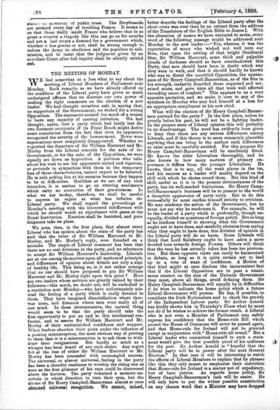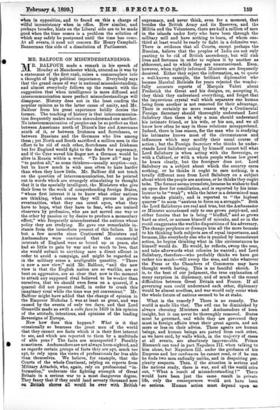THE MEETING OF MONDAY.
WE feel somewhat at a loss what to say about the meeting of Liberal Members of Parliament next Monday. Such remarks as we have already offered on the condition of the Liberal party have given so much undesigned offence that we distrust our own power of making the right comments on the election of a new leader. We had thought ourselves safe in saying that, as supporters of the Government, we wished for a strong Opposition. The statement seemed too much of a truism to have any capacity of causing irritation. We had thought, again, that a party which had lately lost the two foremost occupants of its Front Bench might derive some consolation from the fact that even its opponents recognised the severity of the bereavement. Never were expectations more completely disappointed. Whether we regretted the departure of Sir William Harcourt and Mr. Morley from the Liberal councils for the sake of the Government, or for the sake of the Opposition, we were equally set down as hypocrites. A partisan who talks about his wish to see his opponents united and vigorous, or pretends to sympathise with them in the temporary loss of these characteristics, cannot expect to be believed. He is only poking fun at his enemies because they happen to be in difficulties. Guiltless as we are of any such intention, it is useless to go on uttering sentiments which carry no conviction of their genuineness. In what we say to-day, therefore, we shall be careful to express no regret at what has befallen the Liberal party. We shall regard the proceedings at Monday's meeting with the interested indifference with which we should watch an experiment with gases at the Royal Institution. Emotion shall be banished, and pure diagnosis take its place.
We note, then, in the first place, that almost every Liberal who has spoken about the state of the party has said that the letter of Sir William Harcourt to Mr. Morley, and Mr. Morley's reply, were founded on a mistake. The staple of Liberal comment has been that there are no real divisions in the party, and no reluctance to accept Sir William Harcourt's leadership. Liberals are at one among themselves upon all matters of principle. and differences of opinion about details are only a sign of healthy life. This being so, is it not rather strange that no one should have proposed to put Sir William Harcourt and Mr. Morley right upon this point ? Here are two leaders whose services are greatly valued by their followers—this much, we doubt not, will be embodied in a resolution next Monday—who have unfortunately mis- read the feeling of a party which is really devoted to them. They have imagined dissatisfaction where there was none, and disunion where men were really all of one mind. In these circumstances, the natural thing would seem to be that the party should take the first opportunity to put an end to this intellectual con- fusion, and to assure Sir William Harcourt and Mr. Morley of their undiminished confidence and support. When leaders abandon their posts under the influence of a passing misconception, the most obvious way of proving to them that it is a misconception is to ask them to with- draw their resignations. But hardly so much as a whisper has been heard of any such desire. Any regret felt at the loss of either Sir William Harcourt or Mr. Morley has been concealed with unexampled success. The universal, or almost universal, feeling in the party has been a cheerful readiness to worship the rising sun as soon as the first glimmer of his rays could be discovered above the horizon. The party remained a moment un- certain in which direction to turn their eyes, but the claims of Sir Henry Campbell-Bannerman almost at once obtained universal recognition. We cannot, indeed, better describe the feelings of the Liberal party after the short crisis was over than by an extract from the address of the Translators of the English Bible to James L With the alteration of names we have ventured to make, every word of the following passage might be addressed next Monday to the new leader :—" For, whereas it was the expectation of many who wished not well unto our Sion, that upon the setting of that bright Occidental Star, Sir William Harcourt, some thick and palpable clouds of darkness should so have overshadowed this Party, that men should have been in doubt which Way they were to walk, and that it should hardly be known who was to direct the unsettled Opposition, the appear- ance of Sir Henry Campbell-Bannerman, as of the Sun in his strength, instantly dispelled these supposed and sur- mised mists, and gave unto all that were well affected exceeding cause of comfort." This appears to us a very apposite quotation, and we make it over to any of the speakers on Monday who may find himself at a loss for an appropriate compliment to his new chief.
What will the election of Sir Henry Campbell-Banner- man portend for the party ? In the first place, unless he greatly belies hie past, he will not be a fighting leader. In the present state of Liberal opinion this will probably he no disadvantage. The word has evidently been given to deny that there are any serious differences among Liberals, and if this theory is to seem commonly plausible anything that can bring to the surface such differences as exist must be carefully avoided. For this purpose Sir Henry Campbell-Bannerman will be excellently fitted. He knows the older Liberalism thoroughly, and he also knows in how many matters of primary im- portance it differs from the younger Liberalism. He knows, that is to say, all the weak places in the ice, and his success as a leader will mainly depend on the skill with which he skates round them. But this kind of skill, useful as it is in the present circumstances of the party, has its well-marked limitations. Sir Henry Camp- bell-Bannerman's business will be to present to the world a deceptive appearance of party unity. But to do this successfully he must confine himself strictly to criticism. He may condemn the action of the Government, but he must not say why he condemns it. For example, be will be the leader of a party which is profoundly, though un- equally, divided on questions of foreign policy. But so long as he confines himself to showing what the Government ought not to have done, and carefully abstains from saying what they ought to have done, this division of opinion in the Liberal party will do no harm. Some Liberals will think that Lord Salisbury ought to have oaken a more decided tone towards foreign Powers. Others will think that the tone he has actually taken has been too provoca- tive. But these opposite views can easily be harmonised in debate, so long as it is quite certain not to lead up to a vote of want of confidence. A Motion of that kind might at once disclose the inconvenient fact that if the Liberal Opposition are to pass a unani- mous censure on the sins of the Unionist Government they must, above all things, avoid defining them. Sir Henry Campbell-Bannerman will equally be in difficulties if he tries to indicate the home policy which a future Liberal Government will pursue. He has, if possible, to conciliate the Irish Nationalists and to check the growth of the Independent Labour party. Sir Arthur Arnold has kindly shown him in Thursday's Times what he must not do if he wishes to achieve the former result. A Liberal who is not even a Member of Parliament may safely express his confidence that the Home-rule Bill which passed the House of Commons will never be passed again, and that Home-rule for Ireland will not be granted except in conjunction with " Home-rule all round." But a Liberal leader who committed himself to such a state- ment would give the best possible proof of his unfitness for the post. Sir Arthur Arnold is " hopeful that the Liberal party will be in power after the next General Election." In that case it will be interesting to watch the efforts of Liberal Members to explain that by phrases like this they only meant to emphasise their conviction that Home-rule for Ireland is a matter not of expediency, but of bare justice. As regards home policy, Sir Henry Campbell-Bannerman's task will be easier. He will only have to put the widest possible construction on any chance word. that a Minister may have dropped when in opposition, and to found on this a charge of wilful inconsistency when in office. How similar, and perhaps broader, hints on the Liberal side are to be made good when the time comes is a problem the solution of which may safely be postponed until the time has come. At all events, it need not concern Sir Henry Campbell- Bannerman this side of a dissolution of Parliament.



































 Previous page
Previous page